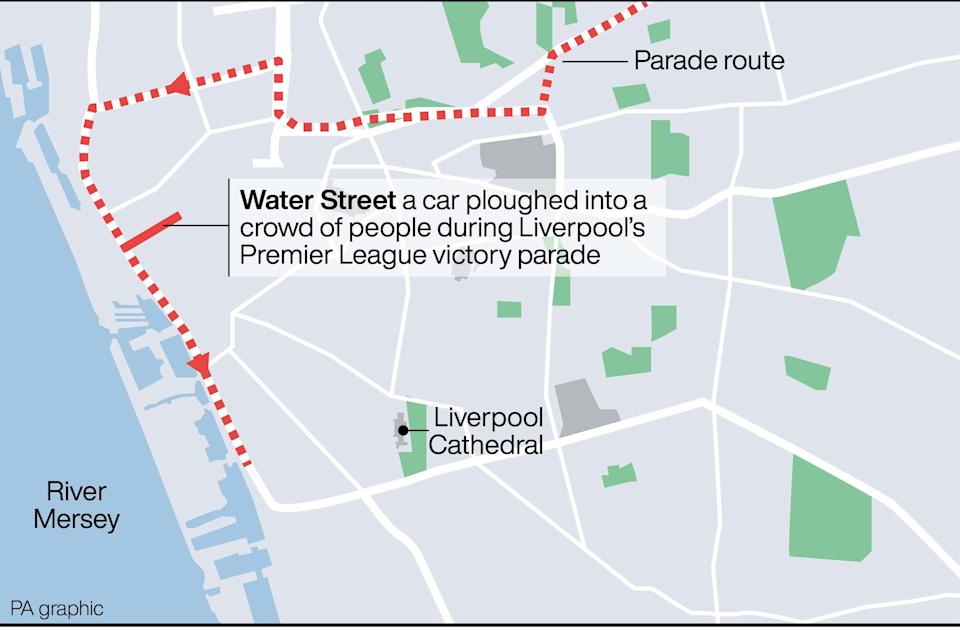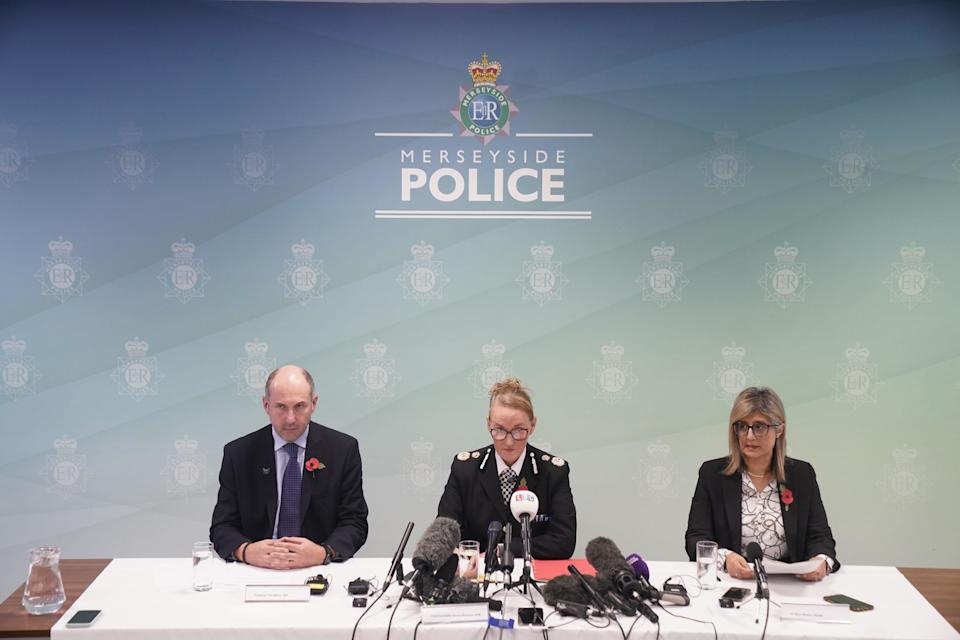A 53-year-old man has been charged with seven offences relating to an incident that saw a car plough into a crowd at Liverpool FC’s victory parade, injuring dozens.
Paul Doyle, from West Derby in Liverpool, will appear at Liverpool Magistrates’ Court on Friday 30 May.
Doyle has been charged with offences including dangerous driving, causing grievous bodily harm (GBH) with intent, wounding with intent to cause GBH and attempting to cause GBH with intent, chief crown prosecutor for the CPS Mersey-Cheshire Sarah Hammond told a press conference on Thursday.
A wounding charge and an attempted grievous bodily harm charge relate to a child.
She added that the investigation is at an early stage and a “huge volume” of evidence is being reviewed.
Seven people remained in hospital in a stable condition after the collision, Merseyside Police announced on Wednesday. It is believed at least 79 people were injured in total, with police revealing on Thursday that the youngest person hurt was nine years old, while the oldest was 78.
According to the BBC, Doyle is a local businessman and has three children. The Times has reported that he is a former Royal Marine and that he went on to become a IT security consultant.
What is the punishment for GBH with intent?
Doyle, whose full name is Paul Desmond Sanders Doyle, has been charged with six counts that are all contrary to Section 18 of the Offences Against The Person Act 1861.
These are two counts of unlawful and malicious wounding with intent to cause grievous bodily harm, two counts of causing unlawful and malicious grievous bodily harm with intent to cause grievous bodily harm and two counts of attempted unlawful and malicious grievous bodily harm with intent to cause grievous bodily harm.

The route of the parade and the collision in Liverpool. (PA)
Sentencing for these offences can range from two to 16 years in prison, with a maximum of life imprisonment.
Sentencing for these crimes depends on the court assessing the level of harm caused to the victim, both physical and psychological. Aggravating factors will also affect a sentence, including previous convictions, motivations for the offence and who it was carried out against, as well as the presence of children, and whether the perpetrator was under the influence of alcohol or drugs. The court will also take into account mitigating factors like remorse, positive character, and any difficult personal circumstances.
Doyle has also been charged with one count of dangerous driving, contrary to section two of the Road Traffic Act 1988. This carries a maximum sentence of two years in prison, with sentencing ranging from a community order to the maximum two years. Someone convicted of this offence will also be disqualified from driving for a minimum of a year.
The CPS said the charges would be kept “under review as the investigation progresses”.
Why police initially gave more information about suspect
Police typically do not release the identity of a suspect after they have been arrested, but on this occasion there was more information released – such as the suspect’s race and ethnicity – than would normally be expected.
This has been tied to concerns raised in the aftermath of the Southport knife attacks last year, which led to widespread rioting and disorder.

Forensic teams search for clues on Water Street in Liverpool. (Getty)
A MPs’ report into the violence published in April found: “The lack of information published in the wake of the murders of Bebe King, Elsie Dot Stancombe and Alice da Silva Aguiar created a vacuum where misinformation was able to grow, further undermining public confidence.”
It added: “We respect the CPS’s commitment to minimising risks to successful prosecutions, but it is clear that neither the law on contempt nor existing CPS guidance for the media and police are fit for the social media age.”
One of Merseyside Police’s former inspectors, Peter Williams, a senior lecturer in policing at Liverpool John Moores University, said the force had adopted a “complete step change” in how it shares information.
He told BBC Radio 4’s Today programme on Tuesday: “It has been a shift, because, particularly in relation to the aftermath of Southport… there was a lot of criticism focused at Merseyside Police and of course the CPS [Crown Prosecution Service], in relation to how the management of information was sort of dealt with.”
Williams said that the force may have also been mindful of how information was handled by Lancashire Constabulary in the disappearance of Nicola Bulley in January 2023, which led to a College of Policing inquiry.

Merseyside Police were criticised for their lack of information following the Southport knife attacks last year. (PA)
Former Metropolitan Police chief superintendent Dal Babu told BBC Radio 5 Live that the decision to release so much information about the suspect was “unprecedented”.
He said: “It’s remarkably striking because police will not release that kind of information because they’ll be worried about prejudicing any future trial, but I think they have to balance that against the potential of public disorder.”
Metropolitan Police Commissioner Sir Mark Rowley also said forces will more often have to release personal details about suspects earlier.
He told BBC Radio 4’s Today programme: “In general, I think we have to be realistic and more often… put more personal details in public, earlier.”
He added that we are in an age of citizen journalism and “some content will be all over social media very, very quickly” and people will be “making guesses and inferences” so “in that world, putting more facts out is the only way to deal with it”.
